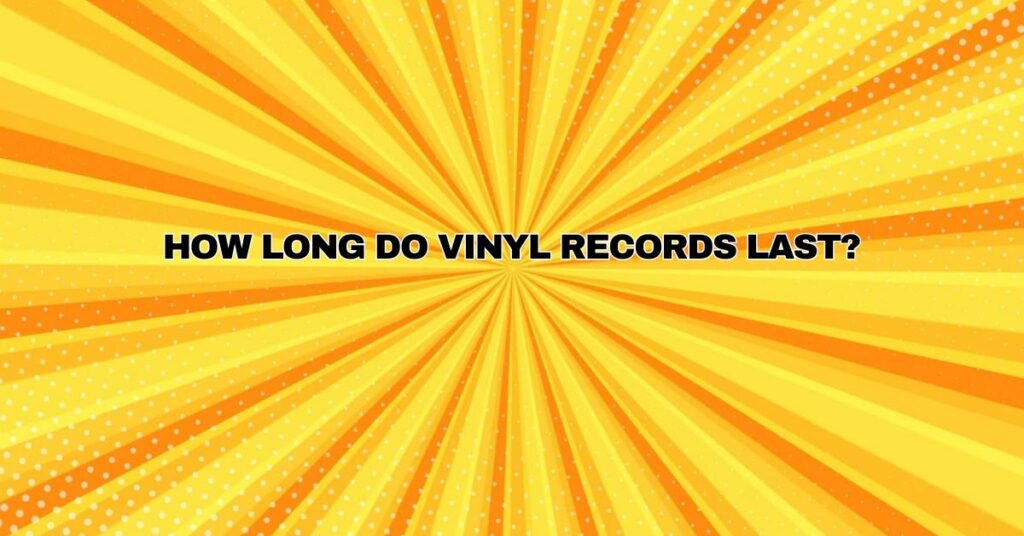In a world dominated by digital music and streaming services, vinyl records have made a remarkable comeback, captivating audiophiles, collectors, and music enthusiasts. Vinyl’s analog charm and warm, organic sound continue to draw listeners to the medium, but a common question lingers: How long do vinyl records last? In this comprehensive article, we will explore the lifespan of vinyl records, the factors that influence their durability, and the steps you can take to preserve them for future generations.
The Material Matters
Vinyl records, as the name suggests, are primarily made of polyvinyl chloride (PVC). This material is known for its durability and resistance to wear and tear, but it is not entirely impervious to the passage of time. The longevity of a vinyl record is influenced by several key factors.
Handling and Storage
One of the most crucial determinants of a vinyl record’s lifespan is how it’s handled and stored. Proper care and maintenance can significantly extend the life of your records:
- Handling: Always handle vinyl records with clean, dry hands to avoid transferring oils and contaminants to the surface. Hold records by their edges to prevent fingerprints and smudges on the grooves.
- Storage: Keep records in a cool, dry environment, away from direct sunlight and extreme temperature fluctuations. Store them vertically, as prolonged horizontal storage can lead to warping. Use anti-static inner sleeves and outer sleeves to protect the record and jacket from dust, dirt, and moisture.
Wear and Tear
Vinyl records, like any physical medium, can suffer from wear and tear over time, which can manifest in various ways:
- Groove Wear: As the stylus tracks through the grooves, some wear is inevitable. Excessive or improper tracking can accelerate groove wear, leading to reduced sound quality.
- Dirt and Contaminants: Dust, debris, and contaminants can accumulate on the surface of the record, potentially causing surface noise and affecting playback quality.
- Warping: Vinyl records are susceptible to warping when exposed to heat, pressure, or improper storage. Warped records may not track properly, resulting in playback issues.
Environmental Factors
Environmental conditions play a crucial role in the longevity of vinyl records:
- Temperature: Extreme temperatures, whether excessively hot or cold, can lead to warping, distortion, and damage. Avoid storing records in attics, basements, or unregulated storage spaces.
- Humidity: High humidity can promote the growth of mold and mildew on records, potentially damaging both the vinyl and the paper labels and sleeves.
Playback and Stylus Condition
The condition of your turntable and stylus (the needle) is critical in determining how long a vinyl record lasts. A well-maintained turntable with an appropriately calibrated stylus exerts minimal wear on records. However, using a damaged or worn stylus can cause excessive damage to the grooves.
Chemical Reactions
Chemical reactions can affect vinyl records over time, including the breakdown of the PVC material. Some records from the 1950s and 1960s experienced issues with “off-gassing,” a phenomenon in which plasticizers within the vinyl can migrate to the surface and interact with the paper labels. This can result in a cloudy appearance on the surface of the record.
Preservation Measures
To ensure the longevity of your vinyl records, consider the following preservation measures:
- Regularly clean your records using a carbon fiber brush or an antistatic brush to remove dust and debris.
- Invest in a high-quality, well-maintained turntable with a properly calibrated stylus.
- Use an antistatic brush and an antistatic inner sleeve before playing records.
- Keep your records stored vertically in a controlled environment, away from direct sunlight and extreme temperatures.
- Use outer protective sleeves to shield the record jacket from wear and tear.
Conclusion
Vinyl records have the potential to last for decades, and even longer, with proper care and maintenance. The lifespan of a vinyl record depends on factors such as handling, storage, environmental conditions, and the quality of playback equipment. While vinyl records may not last forever, they can endure for generations when treated with care and respect. By following best practices in handling and storing your vinyl collection, you can ensure that your records continue to bring joy to music lovers for many years to come.


